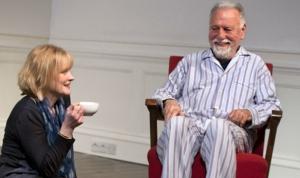The Father Review 2015
I may only be in my mid twenties but Alzheimer's scares me to death. It's a topic, along with similar mental degenerative diseases that doesn't get enough support or awareness, yet Florian Zeller's play explores the issue so effectively that it becomes a bleak sort of 'must see'.
This was a difficult watch, and I don't fully understand who would pay to sit through this as entertainment. I admired everything about the piece from the clever concept to the harrowingly real performances, but there was a certain point where I wanted to stop watching. Drama is often cathartic and should aim to hold a mirror up to real life and provide a vehicle for discussion and debate, but it can hit a point where you wonder where the redeeming feature may be.
Having first hand experience of an almost identical situation I can only commend the production for its realistic handling of the subject matter, and the strength of the central performances. Framed within a tight neon light, underscored by interrupted piano studies, we hear the synapses in the brain failing to connect between each scene before they even begin. Combined with the progressively changing set, the physical aspects of the production stylishly convey meaning without ever pushing too hard.
Composed of short fragmented scenes, the audience becomes as confused as 70 year old Andre, piecing together characters, faces and situations with clarity in the moment, only to struggle to find meaning and truth as similar situations are later repeated. It's a convention that could play as gimmicky, instead it's captivating to see how the patchwork of thought is presented and acted so splendidly that I can't imagine a more effective way of presenting a degenerative mind on stage.
It's the performances that hold the piece together, with Kenneth Cranham delivering a perfectly judged and exhausting central focus alongside Claire Skinner as his frustrated, yet sensitive daughter. Cranham never overplays the condition and that's the key to the piece as a whole. There's no ranting, raving or yelling - instead it's raw and unspeakably honest. His final scenes hammer home the circle of life and our ultimate regression to a childlike state as we watch him cry out for his mummy and are left with dead hope.
Despite this emotion, you find yourself somewhat detached from the characters, attached instead to what they represent, which ultimately makes it harder to leave it all behind you in the theatre. You're never too aware of names or backstories, even the bleak generalised title with its harsh definite article keep it clinical and generalised.
In someone else's hands both play and production could be too representative, too Pinter-esque and ultimately too cold. Instead, James Macdonald's direction and Christopher Hampton's translation strike an affecting level of realism that will stay with you long after the curtain falls.
"Zeller's play is not a study or a discussion of Alzheimer's. It is more profoundly theatrical. It plunges the audience into the experience of dementia. It throws the switches in your brain."
Susannah Clapp for The Guardian
"I'd say it was "unforgettable" if this unqualified triumph didn't load that superlative with long-lingering, chilling doubt."
Dominic Cavendish for The Telegraph
"I found it all far more frustrating than affecting."
Fiona Mountford for The Evening Standard
External links to full reviews from popular press
The Guardian - The Telegraph
Originally published on
